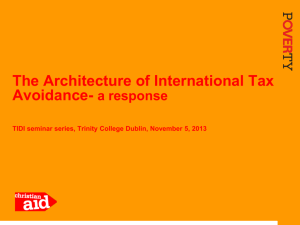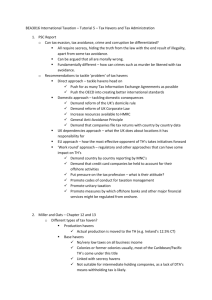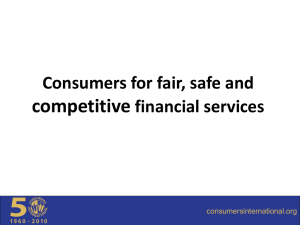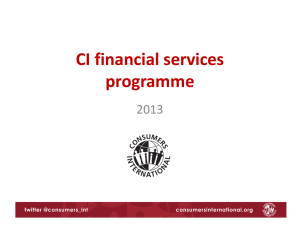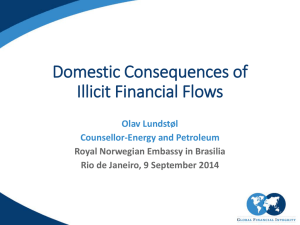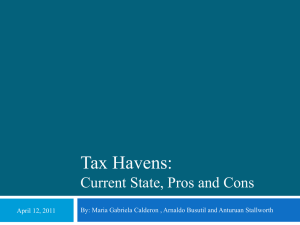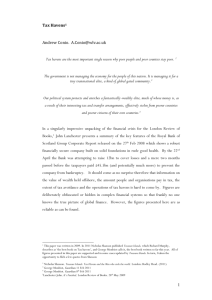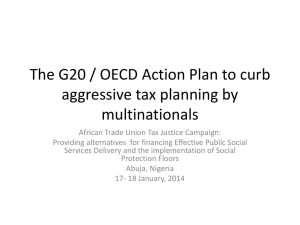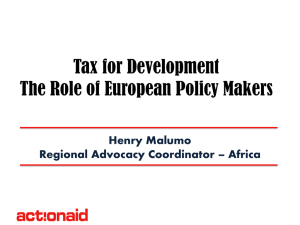the G-Mond Note n°3
advertisement
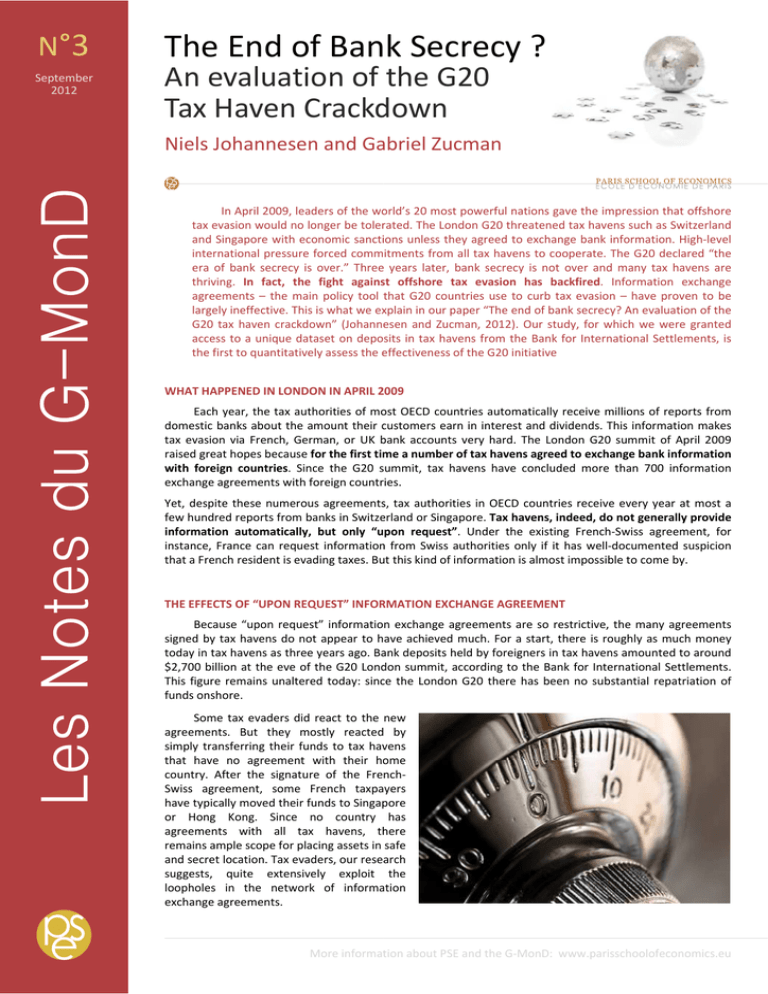
N°3 September 2012 The End of Bank Secrecy ? An evaluation of the G20 Tax Haven Crackdown Niels Johannesen and Gabriel Zucman In April 2009, leaders of the world’s 20 most powerful nations gave the impression that offshore tax evasion would no longer be tolerated. tolerated The London G20 threatened tax havens such as Switzerland and Singapore with economic sanctions unless they agreed to exchange bank information. High-level international pressure forced commitments from all tax havens to cooperate. The G20 declared “the era of bank secrecy is over.” Three years later, bank secrecy is not over and many tax havens are thriving. In fact, the fight against offshore tax evasion has backfired. Information exchange agreements – the main policy tool that G20 countries use to curb tax evasion – have proven to be largely ineffective. This is what we explain in our paper “The end of bank secrecy? An evaluation of the G20 tax haven crackdown” (Johannesen and Zucman, 2012). Our study, for which we were granted access to a unique dataset on deposits in tax havens from the Bank for International Settlements, is the first to quantitatively assess the effectiveness of the G20 initiative WHAT HAPPENED IN LONDON IN APRIL 2009 Each year, the tax authorities of most OECD countries automatically receive millions of reports from domestic banks about the amount their customers earn in interest and dividends. This information makes tax evasion via French, German, or UK bank accounts very hard. The London G20 summit of April 2009 raised great hopes because for the first time a number of tax havens agreed to exchange bank information with foreign countries. Since the G20 summit, tax havens have concluded more than 700 information exchange agreements with foreign countries. countries Yet, despite these numerous agreements, tax authorities in OECD countries receive every year at most a few hundred reports from banks in Switzerland or Singapore. Tax havens, indeed, do not generally provide information automatically, but only “upon request”. Under the existing French-Swiss agreement, for instance, France can request information from Swiss authorities only if it has well-documented suspicion that a French resident is evading taxes. But this kind of information is almost impossible to come by. THE EFFECTS OF “UPON REQUEST” INFORMATION EXCHANGE AGREEMENT Because “upon request” information exchange agreements are so restrictive, the many agreements signed by tax havens do not appear to have achieved much. For a start, there is roughly as much money today in tax havens as three years ago. Bank deposits held by foreigners in tax havens amounted to around $2,700 billion at the eve of the G20 London summit, according to the Bank for International Settlements. This figure remains unaltered today: since the London G20 there has been no substantial repatriation of funds onshore. Some tax evaders did react to the new agreements. But they mostly reacted by simply transferring their funds to tax havens that have no agreement with their home country. After the signature of the FrenchFrench Swiss agreement, some French taxpayers have typically moved their funds to Singapore or Hong Kong. Since no country has agreements with all tax havens, there remains ample scope for placing assets in safe and secret location. Tax evaders, our research suggests, quite extensively exploit the loopholes in the network of information exchange agreements. More information about PSE and the G-MonD: G www.parisschoolofeconomics.eu N°3 – September 2012 As a result, offshore centres that have signed many agreements have experienced a significant exodus of cash. Foreign deposits in Jersey, for instance, decreased by around 60 percent between January 2008 and July 2011. But offshore centres that have signed relatively few agreements have seen a significant influx of funds. Over the same period, foreign deposits in Hong Kong increased by more than 40 percent. Overall, this has been a zero-sum zero game: at the global level, nothing much has changed (see Graph. 1). Graph. 1:: Evolution of bank deposits in tax havens between 2007 and 2011, as a percentage of total 2007 deposit in tax havens WHAT CAN BE DONE ? There has certainly been some qualitative progress in the fight against tax evasion – before 2009, many tax havens refused to sign information exchange agreement altogether. Quantitatively speaking, however, progress is very modest – far too modest to justify any celebration of “the end of bank secrecy.” Yet there exist simple, practical ways to significantly improve tax collection. First, G20 leaders should urge tax havens to sign treaties with all countries: a truly global agreement would prevent tax evaders from transferring their funds from haven to haven. More fundamentally, the G20 needs to rethink its information exchange standard – and drastically strengthen it. “Upon request” information exchange, our results suggest, does not work well. Evading ta-xes through offshore bank accounts remains as easy as it ever was. was Tax specialists widely agree that automatic exchange of information is the most effective solution to curb tax evasion. It would allow tax authorities to obtain comprehensive data about income earned by domestic residents in foreign banks. Automatic reporting of bank information exists within most developed countries – as well as between most EU countries. This widespread mechanism does not pose any great practical difficulties. The European Union pushes for automatic exchange of information: information this is the ultimate goal of the Savings Tax Directive that has entered into force in 2005. Why doesn’t the G20 promote automatic information exchange as well? This would undoubtedly have much larger consequences on tax revenues than its current flawed policy. Références Johannesen and Zucman (2012), “The End of Bank Secrecy? An Evaluation of the G20 Tax Haven Crackdown”, PSE Working Paper, January 2012 Available online at http://www.parisschoolofeconomics.eu/en/zucman eu/en/zucman-gabriel/ More information about the Paris School of Economics and the G-MonD G www.parisschoolofeconomics.eu
